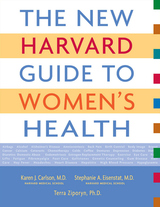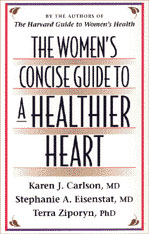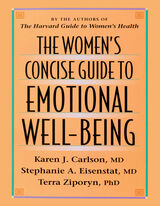
THIS EDITION HAS BEEN REPLACED BY A NEWER 2004 EDITION.
With the publication of The Harvard Guide to Women's Health, women will have access to the combined expertise of physicians from three of the world's most prestigious medical institutions: Harvard Medical School, Massachusetts General Hospital, and Brigham and Women's Hospital. For complete information on women's health concerns, physical and psychological, this A to Z reference book will be the definitive resource.

With the publication in 1996 of The Harvard Guide to Women's Health, women seeking answers to questions about their health had access to the combined expertise of physicians from three of the world's most prestigious medical institutions: Harvard Medical School, Massachusetts General Hospital, and Brigham and Women's Hospital. With complete information on women's health concerns, physical and behavioral, this A to Z reference quickly became a definitive resource, praised especially for its coverage of topics not previously considered under the umbrella of women's health. The New Harvard Guide to Women's Health reunites the authors to bring a valued health reference up to date for a new generation--and for those women who have come to rely on the Harvard Guide and are now wondering what to do about their health as they enter a new stage of life, asking questions like the following: I've been on hormone replacement therapy. Should I stop? How?
Could this rash be lupus?
I've been on the Pill. What is my risk for stroke?
Fat is bad, fat is good: What should I believe? And what's left to eat?
When does ordinary worry become chronic anxiety?
What screening tests do I need now?
In addition to revised recommendations reflecting the current medical thinking on menopause and hormone replacement therapy, the New Harvard Guide includes updated recommendations about cardiac health and heart disease--the #1 killer of women in the United States
entries reflecting recent advances in the understanding and treatment of autoimmune diseases
better coverage of health concerns throughout a woman's life span, from her first period to menopause and beyond, with a new entry on perimenopause
expanded nutritional recommendations, including a unique chart of the U.S. government's Daily Reference Intakes for micronutrients, broken down for teens and women whose needs may differ because they are pregnant, breastfeeding, or postmenopausal
updated information on over-the-counter medications, prescription drugs, procedures, screenings, and diagnostic tests

From the authors of The Harvard Guide to Women's Health
Heart disease is the number one killer of women in this country. Every year half a million American women die of heart problems--and another 2.5 million are hospitalized for heart disease. This book brings the risks and realities of cardiovascular disease for women into clear focus. Where previous books have concentrated on men, The Women's Concise Guide to a Healthier Heart recognizes and clarifies the significant differences between men and women in the diagnosis and treatment of cardiac conditions.
The book lays out in plain English all that we currently know about preventing, recognizing, and living with a heart problem. Does an aspirin a day prevent heart disease in women? Does moderate alcohol consumption help or hurt? What about weight gain in middle age? Estrogen replacement therapy? These are the kinds of everyday, life-and-death questions that are addressed specifically for women in this concise guide. It considers questions of cholesterol and diabetes, stress and depression, diet and smoking. It explores diagnostic procedures and surgeries and explains their differing reliability and benefits for women and men.
Helpfully illustrated and easy to use, clear and comprehensive on every heart problem and related symptom and behavior, this book is the best resource for any woman wishing to understand the health and workings of her heart.

From the authors of The Harvard Guide to Women's Health
This concise guide goes beyond facts and figures to get to the practical theories of women's emotional health. Here, in one volume, is what the experts know about maintaining emotional well-being in women, and about preventing, recognizing, and treating the psychological disturbances and disorders that women experience in their own way.
Just as depression and anxiety are more common among women, many psychiatric disorders are exacerbated by the natural rhythms in a woman's life cycle, such as menarche, menstruation, pregnancy, childbirth, and menopause. This book offers expert insight into why and how such patterns occur, as well as coping strategies for insomnia, substance abuse, domestic violence, and sexual abuse which can occur at any stage of life. Most importantly, the authors answer such pressing questions as: What works best for treating panic attacks and phobias? Should psychotherapy be used in tandem with drugs? How does one choose among group, individual, or family therapy? What are the benefits and drawbacks of drugs such as Prozac? Of beta blockers? Of tranquilizers? Are psychiatric problems passed on to one's children? What are the merits of acupuncture, hypnosis, meditation, sex therapy?
From the complexities of schizophrenia and obsessive-compulsive disorder to the delicate practicalities of sexual response, this guide offers all that a woman might want to know about protecting her psychological health.
READERS
Browse our collection.
PUBLISHERS
See BiblioVault's publisher services.
STUDENT SERVICES
Files for college accessibility offices.
UChicago Accessibility Resources
home | accessibility | search | about | contact us
BiblioVault ® 2001 - 2024
The University of Chicago Press









